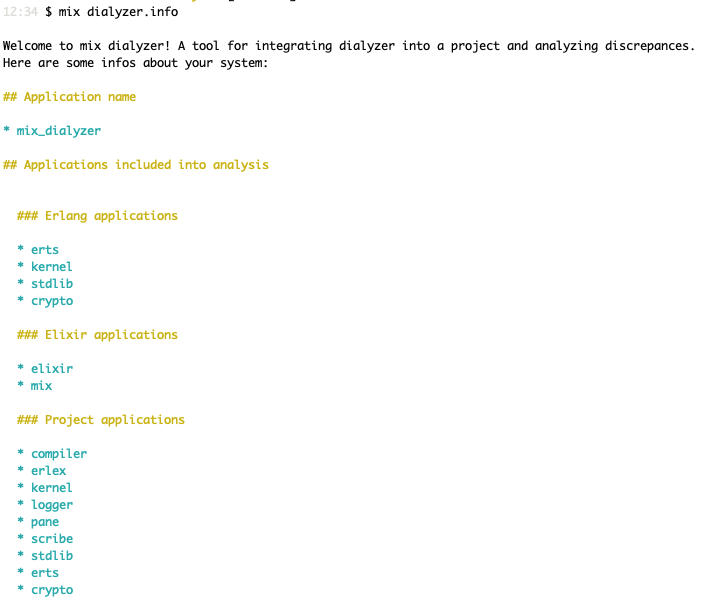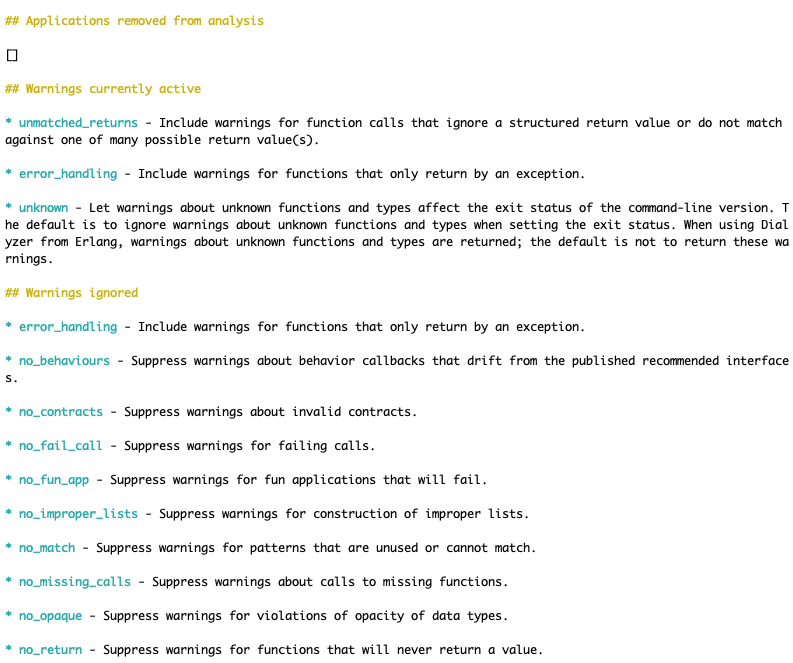Chemanalysis: Dialyzing Elixir
Sean Cribbs
What is Dialyzer?
Did you know…
Elixir Has Types!
They're in the Elixir guides!
@spec days_since_epoch(year :: integer, month :: integer, day :: integer) :: integer
@type color :: {red :: integer, green :: integer, blue :: integer}
Types Help You Find Bugs!
Unknown type: Elixir.Map:t/0
lib/myapp/event_logger.ex:38: Expression produces a value of type 'ok' | {'error',_},
but this value is unmatched
lib/collectable.ex:1: The specification for 'Elixir.Collectable':'__protocol__'/1
states that the function might also return 'true' but the inferred return is
'Elixir.Collectable' | 'false' | [{'into',1},...]
Type Annotations are Optional!
👍 No compilable programs are rejected
😭 Bugs slip through!
Types can be inferred!
defmodule Inference do
def ignore_return do
two_types()
:ok
end
def two_types do
if rem(System.monotonic_time(), 2) == 0 do
{:ok, 2}
else
:odd
end
end
end
lib/inference.ex:3: Expression produces a value of type 'odd' | {'ok',2},
but this value is unmatched
Dialyzer automates checking types
- Figures out what your code calls
- Computes the "success typing" of your program
- Checks for known classes of type errors
Error Classes
Defaults (-Wno_) |
Optional (-W) |
|---|---|
| behaviours | error_handling |
| contracts | race_conditions |
| fail_call | ✅ underspecs |
| fun_app | ✅ unknown |
| improper_lists | ✅ unmatched_returns |
| match | overspecs |
| missing_calls | specdiffs |
| opaque | |
| return | |
| undefined_callbacks | |
| unused |
underspecs
Have you ever seen or written a spec like this?
@spec myfun(any()) :: any()
unknown
Unknown type: Elixir.Map:t/0
unmatched_returns
lib/inference.ex:3: Expression produces a value of type 'odd' | {'ok',2},
but this value is unmatched
Logger.debug("result of call was #{inspect(result)}")
Dialyzer + Elixir
How do I run dialyzer against my Elixir code?
$ mix dialyzer
The Process
- Compile the project
- Check or build PLT(s)
- Analyze your code
- Print warnings (possibly filtered)
Persistent Lookup Tables (PLTs)
| MFA | Type |
|---|---|
| Kernel.round/1 | ((integer() | float()) -> integer()) |
| Map.key/0 | any() |
| :queue.queue/0 | :queue.queue(term()) |
🗂 Function + Type Index
🚀 Greatly speeds up analysis
dialyxir
Most popular, most mature
Sophisticated PLT management
Elixir-friendly warnings
🙅 Transitive dependencies not default in PLT
🤷 Filter on strings or type/file/line
dialyzex
Strictest set of default warnings
PLTs include all of OTP, Elixir, deps
Filter warnings using match-patterns
😉 I wrote it
📦 Big PLTs
🙈 Not very popular
mix_dialyzer
🚨 Not production-ready, GSoC 2018
Elixir-friendly warnings (from dialyxir)
.dialyzer.exs config file
dialyzer.info task 💁
.dialyzer.exs
[
apps: [remove: [], include: []],
warnings: [
ignore: [
{"non_existing", :*, :unknown_type},
{"lib/dialyzer/config/config.ex", 73, :invalid_contract},
{"lib/dialyzer/config/config.ex", 129, :invalid_contract},
],
active: [
:unmatched_returns,
:error_handling,
:unknown
]
],
extra_build_dir: []
]
mix dialyzer.info

mix dialyzer.info

Chemanalysis
or… bugs I found in Elixir with Dialyzer
Bug 1
Fix dialyzer underspec warning with __protocol__/1: PR #5679
Fixed January 19, 2017 (released in Elixir 1.5)
Protocol code generation: def
quote do
name = unquote(name)
arity = unquote(arity)
@functions [{name, arity} | @functions]
# Generate a fake definition with the user
# signature that will be used by docs
Kernel.def unquote(name)(unquote_splicing(args))
# Generate the actual implementation
Kernel.def unquote(name)(unquote_splicing(call_args)) do
impl_for!(t).unquote(name)(unquote_splicing(call_args))
end
# ...
end
Protocol code generation: dispatch
Kernel.def impl_for!(data) do
impl_for(data) || raise(Protocol.UndefinedError, protocol: __MODULE__, value: data)
end
Kernel.def impl_for(%{__struct__: struct}) when :erlang.is_atom(struct) do
struct_impl_for(struct)
end
Kernel.defp struct_impl_for(struct) do
target = Module.concat(__MODULE__, struct)
case impl_for?(target) do
true -> target.__impl__(:target)
false -> any_impl_for()
end
end
Kernel.defp impl_for?(target) do
Code.ensure_compiled?(target) and
function_exported?(target, :__impl__, 1)
end
Protocol code generation: boilerplate
@doc false
@spec __protocol__(:module) :: __MODULE__
@spec __protocol__(:functions) :: unquote(Protocol.__functions_spec__(@functions))
@spec __protocol__(:consolidated?) :: boolean
Kernel.def __protocol__(:module), do: __MODULE__
Kernel.def __protocol__(:functions), do: unquote(:lists.sort(@functions))
Kernel.def __protocol__(:consolidated?), do: false
lib/collectable.ex:1: The specification for
'Elixir.Collectable':'__protocol__'/1 states that the function might also
return 'true' but the inferred return is 'Elixir.Collectable' | 'false' |
[{'into',1},...]
Fixing underspecified __protocol__/1
- @spec __protocol__(:consolidated?) :: boolean
+ @spec __protocol__(:consolidated?) :: false
defp change_impl_for([{:attribute, line, :spec, {{:__protocol__, 1}, funspecs}} | t],
protocol, types, structs, is_protocol, acc) do
newspecs = for spec <- funspecs do
case spec do
{:type, line, :fun, [{:type, _, :product, [{:atom, _, :consolidated?}]}, _]} ->
{:type, line, :fun,
[{:type, line, :product, [{:atom, 0, :consolidated?}]},
{:atom, 0, true}]} # CHANGE HERE
other -> other
end
end
change_impl_for(t, protocol, types, structs, is_protocol,
[{:attribute, line, :spec, {{:__protocol__, 1}, newspecs}}|acc])
end
Bug 2
Remove underspecification warning for consolidated protocols: PR #6627
Fixed October 2, 2017 (released in Elixir 1.6)
Updated Protocol boilerplate
@spec __protocol__(:module) :: __MODULE__
@spec __protocol__(:functions) :: unquote(Protocol.__functions_spec__(@functions))
@spec __protocol__(:consolidated?) :: false
@spec __protocol__(:impls) :: :not_consolidated
Kernel.def __protocol__(:module), do: __MODULE__
Kernel.def __protocol__(:functions), do: unquote(:lists.sort(@functions))
Kernel.def __protocol__(:consolidated?), do: false
Kernel.def __protocol__(:impls), do: :not_consolidated
Changing the spec during consolidation
defp change_impl_for([{:attribute, line, :spec, {{:__protocol__, 1}, funspecs}} | tail],
protocol, types, structs, protocol?, acc) do
new_specs = for spec <- funspecs do
case spec do
# ...
# ADDED:
{:type, line, :fun, [{:type, _, :product, [{:atom, _, :impls}]}, _]} ->
{:type, line, :fun,
[{:type, line, :product, [{:atom, 0, :impls}]},
{:type, 0, :tuple,
[{:atom, 0, :consolidated},
{:type, 0, :list, [{:type, 0, :module, []}]}]}]}
# ...
@spec __protocol__(:impls) :: {:consolidated, [module()]}
Underspecified list of modules
'Elixir.Collectable':'__protocol__'('impls') -> {'consolidated',[module()]}
; ('consolidated?') -> 'true'
; ('functions') -> [{'into',1},...]
; ('module') -> 'Elixir.Collectable'
is a supertype of the success typing:
'Elixir.Collectable':'__protocol__'('consolidated?' | 'functions' |
'impls' | 'module') ->
'Elixir.Collectable' |
'true' |
[{'into',1},...] |
{'consolidated',['Elixir.BitString' | 'Elixir.File.Stream' |
'Elixir.HashDict' | 'Elixir.HashSet' |
'Elixir.IO.Stream' | 'Elixir.List' |
'Elixir.Map' | 'Elixir.MapSet',...]}
Fixing underspecification AGAIN!
[{:type, line, :product, [{:atom, 0, :consolidated?}]},
{:atom, 0, true}]}
{:type, line, :fun, [{:type, _, :product, [{:atom, _, :impls}]}, _]} ->
+ impls = for mod <- types, do: {:atom, 0, mod}
{:type, line, :fun,
[{:type, line, :product, [{:atom, 0, :impls}]},
{:type, 0, :tuple,
[{:atom, 0, :consolidated},
- {:type, 0, :list, [{:type, 0, :module, []}]}]}]}
+ {:type, 0, :list, [{:type, 0, :union, impls}]}]}]}
other -> other
end
end
Bug 3
Guard test tuple_size(…) can never succeed warning: Issue #8157
Fixed by PR #8196 on September 14, 2018 (Released in Elixir 1.8)
The warning
Guard test tuple_size(__@5::#{'__exception__':='true', '__struct__':=_, _=>_})
can never succeed
Prometheus.ex delegation macro
defmacro delegate(fun, opts \\ []) do
fun = Macro.escape(fun, unquote: true)
quote bind_quoted: [fun: fun, opts: opts] do
target = Keyword.get(opts, :to, @erlang_module)
{name, args, as, as_args} = Kernel.Utils.defdelegate(fun, opts)
def unquote(name)(unquote_splicing(args)) do
Prometheus.Error.with_prometheus_error(
unquote(target).unquote(as)(unquote_splicing(as_args))
)
end
end
end
Prometheus.ex error-handling macro
defmacro with_prometheus_error(block) do
quote do
try do
unquote(block)
rescue
e in ErlangError ->
reraise(
Prometheus.Error.normalize(e),
unquote(
if macro_exported?(Kernel.SpecialForms, :__STACKTRACE__, 0) do
quote(do: __STACKTRACE__)
else
quote(do: System.stacktrace())
end
)
)
end
end
end
Elixir exception normalization
error:#{'__struct__' := __@4,'__exception__' := true} = __@3:___STACKTRACE__@1
when __@4 == 'Elixir.ErlangError' ->
_e@1 =
'Elixir.Exception':normalize(
error, __@3,
case __@3 of
__@5 when tuple_size(__@5) == 2 andalso
element(1, __@5) == badkey;
__@5 == undef;
__@5 == function_clause ->
___STACKTRACE__@1;
_ ->
[]
end),
Fixing the guard test
dynamic_normalize(Meta, Var, [H | T]) ->
+ Generated = ?generated(Meta),
+
Guards =
lists:foldl(fun(Alias, Acc) ->
- {'when', Meta, [erl_rescue_stacktrace_for(Meta, Var, Alias), Acc]}
- end, erl_rescue_stacktrace_for(Meta, Var, H), T),
+ {'when', Generated, [erl_rescue_stacktrace_for(Generated, Var, Alias), Acc]}
+ end, erl_rescue_stacktrace_for(Generated, Var, H), T),
- {'case', Meta, [
+ {'case', Generated, [
Var,
[{do, [
- {'->', Meta, [[{'when', Meta, [Var, Guards]}], {'__STACKTRACE__', Meta, nil}]},
- {'->', Meta, [[{'_', Meta, nil}], []]}
+ {'->', Generated, [[{'when', Generated, [Var, Guards]}], {'__STACKTRACE__', Generated, nil}]},
+ {'->', Generated, [[{'_', Generated, nil}], []]}
]}]
]}.
Conclusion
- Dialyzer is a useful tool for improving your code
- Elixir integrates well with Dialyzer
- You can find bugs in Elixir!
Thanks!
https://seancribbs.com/presentations/chemanalysis-dialyzing-elixir.html